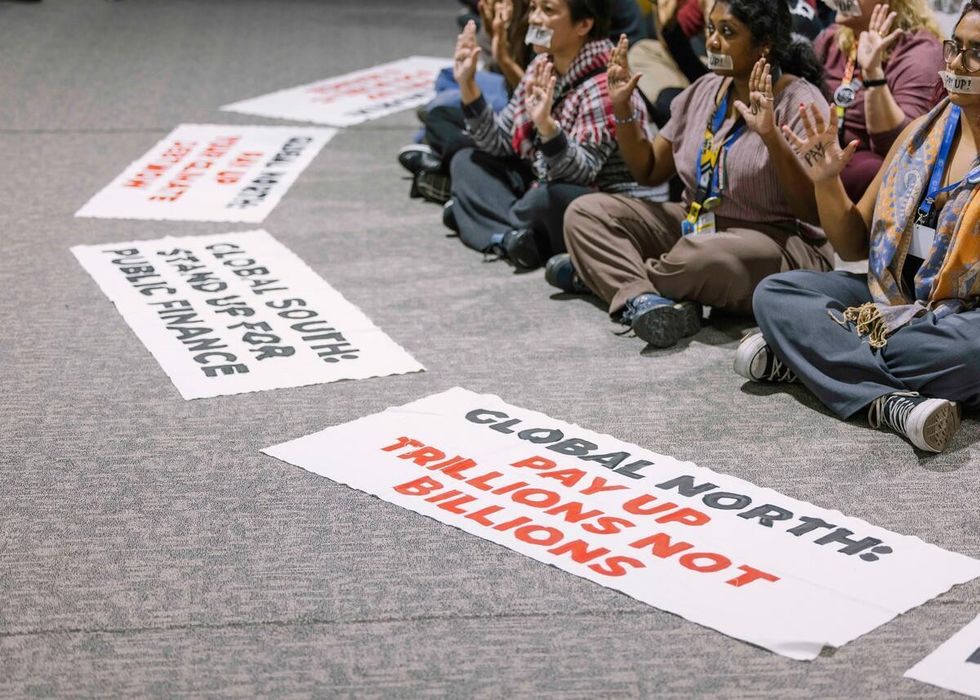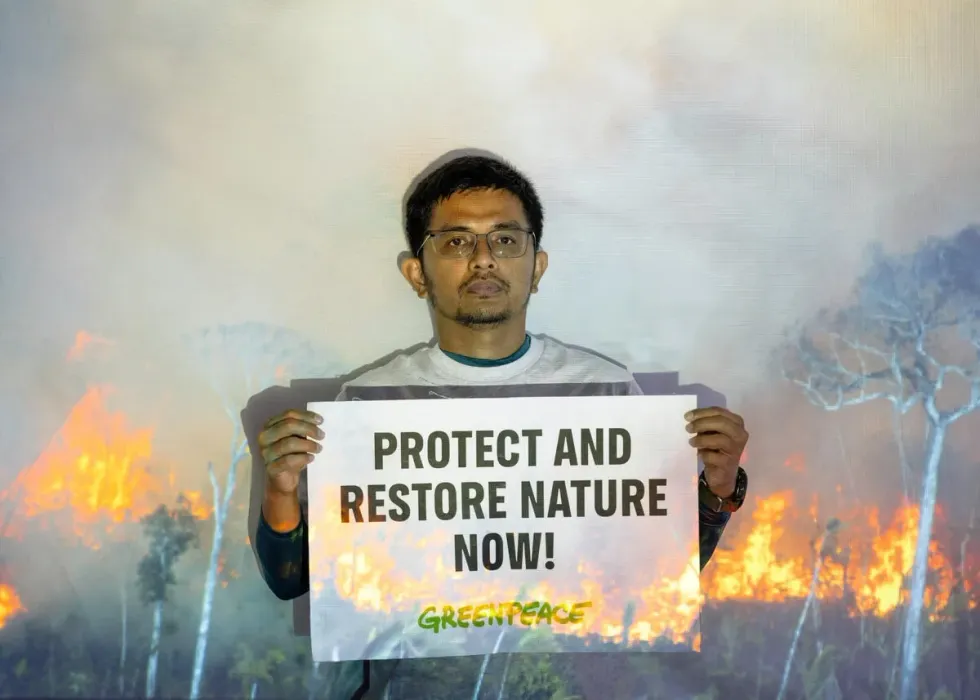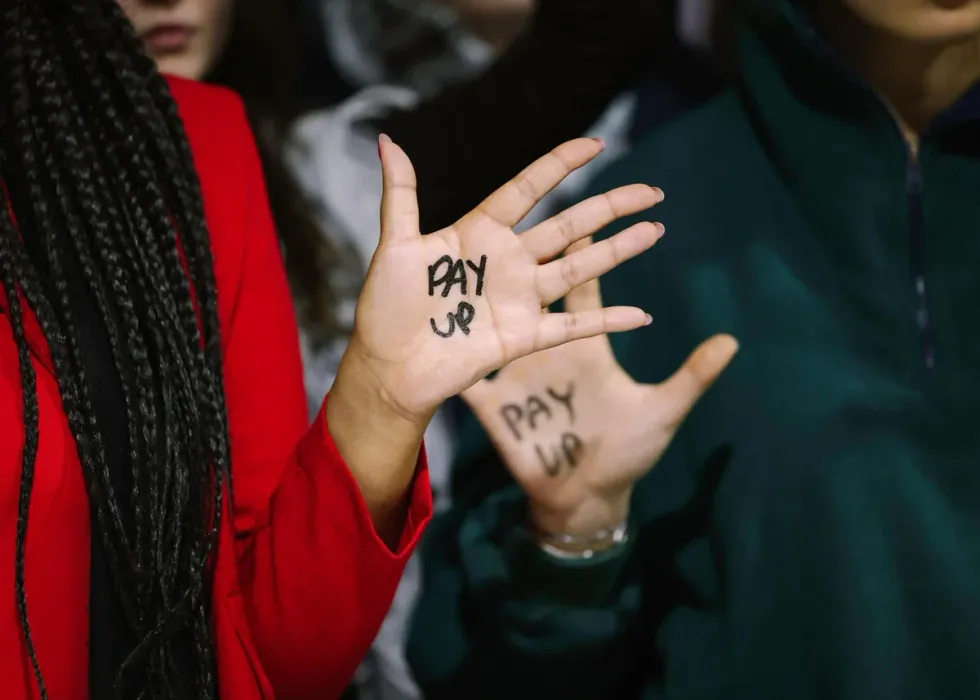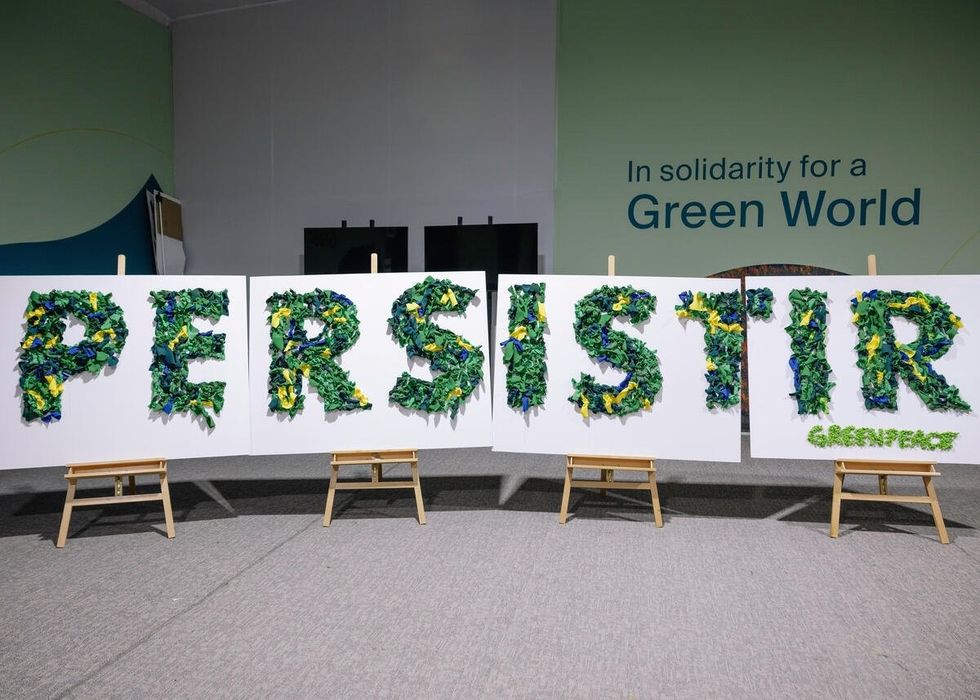

SUBSCRIBE TO OUR FREE NEWSLETTER
Daily news & progressive opinion—funded by the people, not the corporations—delivered straight to your inbox.
5
#000000
#FFFFFF
To donate by check, phone, or other method, see our More Ways to Give page.


Daily news & progressive opinion—funded by the people, not the corporations—delivered straight to your inbox.
"What's at stake here isn't just who pays for climate disasters—it's whether our democracy allows powerful industries to simply rewrite the rules when justice catches up to them," said the communications director at Make Polluters Pay.
Over 190 groups are urging Democrats in Congress resist any attempts by Big Oil to evade potential legal liability amid the growing number of legal and legislative efforts aimed at holding major polluters accountable for their role in the climate crisis.
In a Thursday letter addressed to Senate Minority Leader Chuck Schumer (D-N.Y.) and House Minority Leader Hakeem Jeffries (D-N.Y.), the groups urge Democratic lawmakers "to proactively and affirmatively reject any proposal that would shield fossil fuel companies" from those efforts.
A quarter of U.S. residents live in a state or locality that is "taking ExxonMobil and other major fossil fuel companies to court to hold them accountable for this deception and make them pay for the damage their climate lies have caused," according to the letter. Maine, for example, became the eighth U.S. state to sue major oil and gas companies for deceiving the public about their products' role in the climate crisis.
The letter signatories include a long list of green groups such as the Center for Biological Diversity and Extinction Rebellion US, as well as the American Association of Justice and other nonprofits.
The Supreme Court on Monday denied a request by a coalition of Republican state attorneys general aimed at preventing oil and gas companies from facing these types of lawsuits. Trump has also vowed to block climate litigation aimed at Big Oil.
In their letter, the groups also point to a number of efforts, some successful, to pass what are known as "superfund laws," which force privately owned polluters to help cover the costs of protecting public infrastructure from climate-fueled threats. Oil and gas companies have lobbied against the passage of these laws.
"What's at stake here isn't just who pays for climate disasters—it's whether our democracy allows powerful industries to simply rewrite the rules when justice catches up to them," said Cassidy DiPaola, communications director of Make Polluters Pay—one of the letter's signatories—in a Thursday statement.
"Lawmakers must decisively reject any attempt by the fossil fuel industry to evade accountability and ensure both justice today and the right of future generations to hold polluters responsible for decades of deception," DiPaola continued.
The letter references episodes when "fossil fuel companies and their allies" tried to "secure a blanket waiver of liability for their industry."
In 2017, a carbon tax plan spearheaded by a group of Republican statesmen and economists proposed stopping potential lawsuits against oil companies and other corporations that release greenhouse gases, and in 2020, the fossil fuel industry tried to quietly include a liability waiver for itself in a government Covid-19 relief package, according to the outlet Drilled.
The letter also highlights that 60 Democratic House members urged leadership to categorically oppose efforts to "immunize polluters" in response to the latter effort.
"We have reason to believe that the fossil fuel industry and its allies will use the chaos and overreach of the new Trump administration to attempt yet again to pass some form of liability waiver and shield themselves from facing consequences for their decades of pollution and deception," the letter states. "That effort—no matter what form it takes—must not be allowed to succeed."
The demand from these groups comes amid broader attacks on climate and environmental protections from the Trump administration
On Wednesday, the head of the U.S. Environmental Protection Agency announced a series of actions to roll back environmental regulation impacting issues ranging from rules on pollution from power plants to regulations for vehicles.
On his first day in office, Trump signed executive orders withdrawing the United States from the Paris Climate Agreement and initiated plans to open up Alaskan wilderness to drilling and mining.
Not only do we know that there is opportunity in how we meet this moment, but there are sparks suggesting that we may actually be on our way.
This is a jarring time for our country: A far-right autocrat is taking office on a holiday many misrepresent and trivialize as vacation day, obscuring the revolutionary actions of one of the historical greats of the civil rights movement, while whole communities of Black and Brown people in Los Angeles are burning to the ground. Instead of talking about the lives lost and how to support those who will have the most trouble rebuilding, and instead of connecting the dots of these fires to climate change, the incoming administration is intent on spreading disinformation. They are threatening to undo decades of hard-fought progress with lies and deregulation.
Yet, it is often when things seem most bleak, amid grief and heartache, that we reevaluate on the scale the moment demands. That is where the climate movement is right now: The status quo is not working. We are rapidly surpassing many of the planetary thresholds, including the threshold of 1.5°C. As our climate changes, we continue to see an increasing number of catastrophic weather events, as witnessed over the last week in Los Angeles. And despite these climate disasters and massive advances in renewable energy, fossil fuel use also continues to increase; this was true even under former President Joe Biden’s more progressive presidency. Data centers for artificial intelligence and logistics have only added to this increased demand.
We urgently need to change our orientation to how we affect change and what is required. Survivors on the Titanic talked about why they didn’t move: Electricity was still functioning; it didn’t feel like the ship was going down. Being in power can feel like that. But losing power feels different—and we have to be clear-eyed that we will not succeed by lobbying President Donald Trump or his administration, or finding the right words to plead with them. So we must evaluate the levels of power that are available to us, and how we can collectively accept and redistribute the heightened risk that comes in resisting the far-right and their fossil-fueled agenda on the scale we need to.
Rather than a patchwork of different issue-based fights where each issue area elbows the other out of the way to be heard by the administration, we will see the power that is possible through a coordinated movement protecting each other.
There’s hopeful news: Not only do we know that there is opportunity in how we meet this moment, but there are sparks suggesting that we may actually be on our way.
First, we will see, and are already seeing, an increase in exciting local organizing efforts. Groups in the 350 network have been doubling down on organizing against the power of utility companies. Many of our utilities are hurting the planet by continuing to burn fossil fuels, while simultaneously gouging customers in the realm of profits. Many groups are holding utilities accountable by banning them from using ratepayers money for lobbying, intervening in hearings, and running bold corporate campaigns to get them to change their practices.
We are also seeing organizers in more and more states pass Make Polluters Pay legislation, which forces the corporations responsible for the climate crisis to pay for its cleanup.
Second, once we’ve accepted that we cannot change the initial moves Trump will make to gut climate progress, we can move into action to create the kind of reaction that might prevent further moves and bolster the local governments and courts’ ability to have an impact. We have seen this work: When Trump issued his infamous “Muslim Ban” order, tens of thousands of people disrupted business as usual at the airports, creating the popular dissent to allow the courts to throw the order out. I suspect we will see similar moves around potentially leaving the Paris accords, mass drilling on public lands, or the overturning of regulations.
The sad reality is that, no matter what Trump does, we know we will see more climate impacts that bring the climate crisis to more and more of our front doors. Amid the grief at all we have lost in the process, we have also seen people rise to the occasion in ways they’d previously been unwilling. In response to the Los Angeles fires, we have seen rapid, creative, and far-reaching mutual aid organizing spreading rapidly: a little ad hoc window into the social protections we are calling for. Data shows that most people now know that fossil fuel companies are responsible for climate change, so alongside strengthening our mutual aid infrastructure, we suspect that we will see an uptick in calls for accountability for those responsible.
Finally, the key to a broad-based movement is, quite simply, a broad base of people. As people think about the climate conditions in LA that caused fires and displacement, we can help them connect the dots to similar conditions that people faced in their home countries, causing them to migrate. We will see support for the immigrant struggle from the climate movement, support for labor rights and government workers for all sectors. In short, rather than a patchwork of different issue-based fights where each issue area elbows the other out of the way to be heard by the administration, we will see the power that is possible through a coordinated movement protecting each other.
None of this will be easy. As befits the true Martin Luther King Jr. who, along with many of his co-organizers, spent countless weeks in jail and braved white supremacist violence which killed so many during the civil rights movement. But we collectively know that this level of organizing and intensification of our struggle is necessary. Conditions change, and we change, and so, we are optimistic that out of what is hard right now, we will finally build something beautiful.
Despite what was and was not agreed in Baku, meaningful climate action will only become more urgent than ever.
After extra time of exhausting negotiations, the 29th U.N. Conference on Climate Change is over.
First, a quick refresher of what COP29 was meant to achieve: dubbed a ‘finance COP,’ countries were expected to come to Baku, Azerbaijan ready to present in good faith various finance deals to strengthen the global response to climate change.

The final agreement
After two slow-moving weeks of climate talks, COP29 ended with a woefully inadequate agreement on a new annual public climate finance goal of US$300 billion by 2035, a dismaying offering. The final agreement overall also included disappointing loopholes on carbon markets and little climate action, but no backsliding on the COP28 decision to transition away from fossil fuels. The final outcome in Baku removed the references to the Make Polluters Pay principle at the last hour, further disheartening civil society and countries already bearing the brunt of the climate crisis.

COP29 was an opportunity to agree on a significant climate finance goal and follow up on what was promised at COP28 and the Biodiversity COP16. But that did not exactly happen. Despite what was and was not agreed in Baku, meaningful climate action will only become more urgent than ever.
A moment of hope
Not all is lost though. The final outcome fell short of what was hoped for, and what is needed to battle the climate crisis. But the people power in Baku made its presence felt. Navigating tight guidelines and pushback on peaceful protest for a third year in a row, civil society got creative to still make its demands heard, and will return even more determined next year. The time for debate is over; decisive action is the demand of the hour.

What comes next for climate action
COP30 will return next year, in the Amazon city of Belem, Brazil, with high expectations for renewed climate action.

But climate justice will only be delivered when there is adequate, and then some, finance for climate-vulnerable communities, and not just distributed for loss and damage, but for adaptation and mitigation too. A future with climate justice means the production and consumption of oil and gas has been ended, forests protected, and polluters paying for the damage, destruction, and deaths the climate crisis is causing.
Baku might have stumbled on climate justice, but we will persist in the fight for our future.